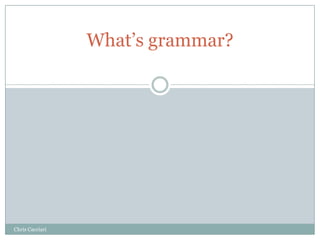
What’s grammar ?
- 2. Grammar is the structural foundation of our ability to express ourselves. Grammar = Structural foundation Chris Cacciari
- 3. Grammar provides you with the structure you need in order to organize and put your messages and ideas across. Chris Cacciari
- 4. Grammar provides you with the structure you need in order to organize and put your messages and ideas across. Chris Cacciari
- 5. Grammar provides you with the structure you need in order to organize and put your messages and ideas across. Chris Cacciari
- 6. But, a good command of the english grammar doesn’t mean that you are able to communicate effectively. Chris Cacciari
- 7. When to use? What for? How? Focus on the usage of grammar Chris Cacciari
- 8. Present Perfect Simple or Past Simple? We use the Present Perfect Simple: We use the Past Simple: With since or for, about With for, about a period a period of time which is of time which is finished: still continuing: I lived there for 4 years. I’ve lived there for 4 (= but I don’t live there years. now) (= and I still live there) I moved there. I live there. I moved there. I moved out. I don’t live there. Chris Cacciari
- 9. Present Perfect Simple or Past Simple? We use the Present Perfect Simple: We use the Past Simple: With questions asking With questions asking how how long for situations long/ when for finished situations : that still happen: How long did you live there? How long have you lived there? When did you live there? (I know you still live (I know you don’t live there anymore) there) Chris Cacciari
- 10. Present Perfect Simple or Past Simple? We use the Present Perfect Simple: We use the Past Simple: A. Ongoing at the B. Wholly in the past present Howlong have you been in How long were you in Florida? Florida. I arrived here in May. I arrived there in May. I am still here. I left there in July. I have been here since I was there for two May. months. Chris Cacciari
- 11. When and How Long indicate different things. We use the Present Perfect Simple: We use the Past Simple: With questions asking With questions asking when: how long: (When usually indicates a (How long indicates a specific point in time, or period or length of something that is considered time, with a beginning and as a specific point.) ending point.) How long have you lived in When did you move to Arizona? Arizona? I have lived here since 1997. I moved here in 1997. (Asks for length of time.) (Asks for specific time) Chris Cacciari
- 12. "Actions" usually happen at a point in time, whereas things such as "possession,"status" "condition" "awareness" refer to something that continues over a period of time. We use the Present Perfect Simple: We use the Past Simple: Status/condition/po Action ssession/awareness (When did you . . .?) (How long have you . . meet your best friend .?) get/buy that new watch known your best friend become a lawyer had that new watch been a lawyer Chris Cacciari
- 13. Present Perfect Simple or Past Simple? We use the Present Perfect Simple: We use the Past Simple: For unfinished actions For completed actions and and events, often with events in the past, often still or yet: with ago: I finished it half na hour I still haven’t finished it. ago. I haven’t finished it yet. Chris Cacciari
- 14. Present Perfect Simple or Past Simple? We use the Present Perfect Simple: We use the Past Simple: To talk about To talk about when you experiences you’ve been had an experience: through during your life: I went to Los Angeles last I’ve been to Los Angeles month. but not New York. (= in I went to Los Angeles but my life up to now) not to New York (= on a particular trip which is the past) Chris Cacciari
- 15. Present Perfect Simple or Past Simple? We use the Present Perfect Simple: We use the Past Simple: To focus on the result of To talk about past events na activity or event which are not connected which is complete: to the present: I’ve read the The Chinese invented newspapers. printing. Teacher,I’ve done my homework, may I hand it in? Chris Cacciari
